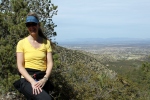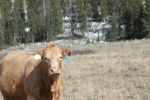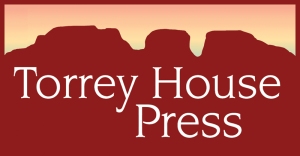Browsing All Posts filed under »Conservation«
The Publishing (ad)Venture
We started Torrey House Press in 2010 with the tag line “Love of the Land” and with an objective to promote more grass on the mountains and water in the streams in the West and to do so via literature. We set out to get on the front lines of the very idea of literature […]
The Elephant in the Room is a Cow — Grazing Impacts on So. Utah Forests
September 23, 2014
My wife and I are both sixth generation Utahns. We own homes in both Salt Lake and Wayne counties. We were married in the Capitol Reef National Park outdoor amphitheater in 2010. Together we cherish the natural landscape of Utah, our pretty, great state. Except for one thing. We have become sensitized to the damage […]
Sky Islands and Writers
April 2, 2014
 Kirsten soared in the stiff breeze on a floating sky island, 1500 feet above the surrounding mile high mesquite desert, smiling as always. We had been invited to run some publisher workshops for the Cochise College Creative Writing Celebration the last weekend in March. (read more . . .)
Kirsten soared in the stiff breeze on a floating sky island, 1500 feet above the surrounding mile high mesquite desert, smiling as always. We had been invited to run some publisher workshops for the Cochise College Creative Writing Celebration the last weekend in March. (read more . . .)
A Book Can Still Make a Difference
March 21, 2014
 Last night Kirsten and went to a lecture by Michael Soule', father of the conservation biology movement. I credit Soule for adding value back to his science of ecology by doing something about it, including founding the Wildlands Network to create wildlife corridors that enable adequate migration to protect species necessary genetic diversity. [read more . . .]
Last night Kirsten and went to a lecture by Michael Soule', father of the conservation biology movement. I credit Soule for adding value back to his science of ecology by doing something about it, including founding the Wildlands Network to create wildlife corridors that enable adequate migration to protect species necessary genetic diversity. [read more . . .]
Exclosures – August 2012
August 19, 2012
Kirsten and I went up to the Fish Lake National Forest and camped on Thousand Lake Mountain in southern Utah for a couple of nights this last Thursday through Saturday August 16-18. This area is just north of Torrey and we like to get up there in the summer just to get out and to […]
More public hurt from welfare ranching . . .
March 14, 2012
What to do about the Cattlemen’s Beef Association's imperial control over federal land-use policy in the West?
 From an essay by Christopher Ketchum in The American Prospect comes some acute observations about the power abuse in the face of common sense and at the expense of the public and the land:
From an essay by Christopher Ketchum in The American Prospect comes some acute observations about the power abuse in the face of common sense and at the expense of the public and the land:
“It’s almost a matter of religiosity that the real costs of ranching are paid for by the public,” says Brian Ertz, media director with the Western Watersheds Project. “Democratic and Republican congresspersons alike make their way up through political environments of extreme livestock--culture-dominated political organizations. The statehouses are dominated by livestock interests, and that’s where the federal representatives cut their teeth.” Click on title for more . . .
Don’t photograph that cow!
March 3, 2012
 I've been reading quite a bit about the history and current practice of grazing on public lands. My question has always been how so few people could have such huge political clout. The answer is complex and fascinating. Much of the answer revolves around the power of the cowboy myth in the mind of the American and particularly in the mind of the American congressperson. I think I will blog a bit about some current examples of both regulatory and political capture and about the harm that public land grazing does. Here's a current example of where the reactionary Utah congress is working on a law to make it illegal to take a picture of a cow. >>>more
I've been reading quite a bit about the history and current practice of grazing on public lands. My question has always been how so few people could have such huge political clout. The answer is complex and fascinating. Much of the answer revolves around the power of the cowboy myth in the mind of the American and particularly in the mind of the American congressperson. I think I will blog a bit about some current examples of both regulatory and political capture and about the harm that public land grazing does. Here's a current example of where the reactionary Utah congress is working on a law to make it illegal to take a picture of a cow. >>>more
Golden Saddles
February 10, 2012
 Grazing in the Intermountain West does more environmental damage than any other single activity. But ranchers have always had a choke hold on western legislators and most of the public land is grazed. One force that could overcome the ranchers grip is the market. Retirements of grazing permits (they are permits, not rights) are refered to sometimes as gold saddles. There is currently such a proposal by a legislator whose name is Adam Smith. An almost-too-perfect name for a guy coming up with an "invisible hand" market based solution. With such poetic grace on its side, the grazing retirement option may be getting a little closer. See Jodi Peterson's article in High Country News.
Grazing in the Intermountain West does more environmental damage than any other single activity. But ranchers have always had a choke hold on western legislators and most of the public land is grazed. One force that could overcome the ranchers grip is the market. Retirements of grazing permits (they are permits, not rights) are refered to sometimes as gold saddles. There is currently such a proposal by a legislator whose name is Adam Smith. An almost-too-perfect name for a guy coming up with an "invisible hand" market based solution. With such poetic grace on its side, the grazing retirement option may be getting a little closer. See Jodi Peterson's article in High Country News.
What uses most of the land and water without showing up in production?
February 6, 2012
 70% of the land in Utah is public. And 70% of that land is handed out for grazing. Over 80% of the water used in Utah is for agriculture and most of that is to grow hay for livestock. That is a lot of land and water. Open this chart on the left of the State of Utah Governor Gary R. Herbert Economic Report's figures on employment by industry as a percent of total employment: Dec. 2011. Where's agriculture? The subsidized use of all that land and water isn't producing much, particularly jobs.
70% of the land in Utah is public. And 70% of that land is handed out for grazing. Over 80% of the water used in Utah is for agriculture and most of that is to grow hay for livestock. That is a lot of land and water. Open this chart on the left of the State of Utah Governor Gary R. Herbert Economic Report's figures on employment by industry as a percent of total employment: Dec. 2011. Where's agriculture? The subsidized use of all that land and water isn't producing much, particularly jobs.
What does it cost to feed a gerbil for a month?
February 6, 2012
Probably more than $1.35. This is all that is charged to feed a cow AND its calf: Grazing fees on federal public lands to remain the same.
Failure of Land Use Socialism
January 4, 2012
 There is nothing more harmful to the arid lands of the American West today than public land grazing. It is ironic that the Cato Institute, the leading libertarian, conservative think tank calls the results of over a century of grazing on public lands, " . . . a testimony to the failure of land-use socialism." Ouch. 70% of the over 300 million acres of public land in the West is grazed, producing less than 3% of the nation's beef. Agriculture is less than 1% of the western economies but uses nearly 80% of the water, much of that used to grow hay for to feed livestock. Ranching is a tiny little special interest. A rancher pays $1.35 per month to graze a cow and its calf. How much do you suppose it costs to feed a gerbil for a month? Yet the BLM, with $40 million of taxpayer stimulus money, wants to ignore the impact of grazing in their Rapid Ecoregional Assessments project to map ecological trends throughout the West. See more here . . . >>
There is nothing more harmful to the arid lands of the American West today than public land grazing. It is ironic that the Cato Institute, the leading libertarian, conservative think tank calls the results of over a century of grazing on public lands, " . . . a testimony to the failure of land-use socialism." Ouch. 70% of the over 300 million acres of public land in the West is grazed, producing less than 3% of the nation's beef. Agriculture is less than 1% of the western economies but uses nearly 80% of the water, much of that used to grow hay for to feed livestock. Ranching is a tiny little special interest. A rancher pays $1.35 per month to graze a cow and its calf. How much do you suppose it costs to feed a gerbil for a month? Yet the BLM, with $40 million of taxpayer stimulus money, wants to ignore the impact of grazing in their Rapid Ecoregional Assessments project to map ecological trends throughout the West. See more here . . . >>
What happened to conservatives conserving?
December 23, 2011
 It seems to me the rabid right in American politics today have lost track of some of their guiding principles, some of the great virtues. Ted Williams writes in a recent blog, " we need to grow our web of friends among those who are politically middle-of-the-road or even slightly to the right, and among those in small towns and the hinterlands. Too often we think the only field where we can gather new backers is the progressive/liberal one, but clubs such as Republicans for Environmental Protection, Backcountry Hunters and Anglers, and Trout Unlimited strongly show that there are more than a few folks caring about wild things who are not progressives, who may even be conservatives." Ted thinks that Piety, Prudence, Posterity are principals that conservatives naturally honor, and if they applied them to how they live in place, they would find they should be, in fact and act, conservationists. . . . >>more
It seems to me the rabid right in American politics today have lost track of some of their guiding principles, some of the great virtues. Ted Williams writes in a recent blog, " we need to grow our web of friends among those who are politically middle-of-the-road or even slightly to the right, and among those in small towns and the hinterlands. Too often we think the only field where we can gather new backers is the progressive/liberal one, but clubs such as Republicans for Environmental Protection, Backcountry Hunters and Anglers, and Trout Unlimited strongly show that there are more than a few folks caring about wild things who are not progressives, who may even be conservatives." Ted thinks that Piety, Prudence, Posterity are principals that conservatives naturally honor, and if they applied them to how they live in place, they would find they should be, in fact and act, conservationists. . . . >>more

November 22, 2014
0